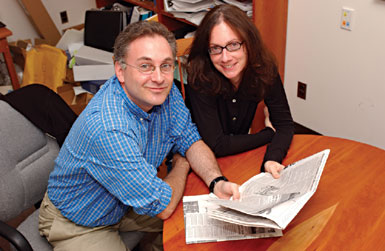Vital Signs
Study documents strong enthusiasm for cancer screening
For years, public-health agencies and medical professionals have been promoting the benefits of screening to detect cancer early. So three DMS researchers—Lisa Schwartz, M.D., Steven Woloshin, M.D., and H. Gilbert Welch, M.D., M.P.H.—decided to explore how enthusiastic the public is about early screening. Their findings were published in January in the Journal of the American Medical Association.
Beliefs: They conducted phone interviews with 500 adults who had never had cancer. The study participants were asked about several common cancer screening tests—colonoscopy or sigmoidoscopy for colon cancer, Pap smears for cervical cancer, mammography for breast cancer, and PSA testing for prostate cancer. The survey assessed respondents' beliefs about early detection and their attitudes about false-positive results.
The research team, which is based at the White River Junction, Vt., VA Medical Center, found that the public is "very enthusiastic" about early screening: 87% of respondents believe routine cancer screening is almost always a good idea, and 74% think early detection saves lives most or all of the time. Twothirds said they would want to be screened for a cancer even if it was untreatable.

|
|
Steve Woloshin and Lisa Schwartz (pictured above)
and Gil Welch (see the box on page 3 for word of a
new book he just published) recently released a study
on the public's attitudes about cancer screening. |
In fact, the respondents' attitudes toward screening seemed to go beyond mere enthusiasm. "Our sense was that people didn't see it as a decision," says Schwartz. "They saw it more as an obligation." This is due in part, she theorizes, to strong preconceptions about what such tests can do. In turn, this makes it hard for people to realize that there are not only potential benefits but also potential harms from screening.
"You can always find something abnormal" from screening, explains Woloshin. "The question is, does it matter? What may not be clear in patients' minds when they agree to screening is that they could be opening a Pandora's box." Often, an abnormality picked up in early screening leads to a series of invasive, traumatic, and possibly disfiguring procedures. Given that, is screening worthwhile?
Relief: According to this study, the answer for most patients is overwhelmingly yes. For example, 38% of respondents had experienced at least one false-positive result, with a waiting period from the false alarm to the results showing that they did not, in fact, have cancer ranging from two weeks to over a month. Many described this time as either "very scary" or "the scariest time of my life." Yet 98% were glad they'd had the test. "The relief that they don't have cancer overwhelms people's ability to recognize that the testing and fear may have been unnecessary," says Schwartz.
Taking their inquiry a step further, the research team asked how patients would respond if their doctors recommended less frequent screening. For all tests, a majority of those surveyed said they would overrule their physician; for example, 74% would seek colonoscopy or sigmoidoscopy even if their physician advised against it.
Scan: The survey also asked respondents about their attitudes regarding total-body CT scanning— a new technology that's been publicized as a way to find early cancer, though no medical organization has endorsed it and no studies have shown it to be beneficial or even safe.
Nevertheless, 86% of respondents said they would choose to have one if it was free, and 73% would choose such a scan over receiving a payment of $1,000. People assume, says Woloshin, "that any test that detects cancer early is good."
But evidence for the efficacy of screening is variable. To make good decisions, say the researchers, people should avoid generalizing about tests and ask if studies have shown that a particular test saves lives. "It is not wrong to be enthusiastic about screening," says Schwartz, "but be an informed consumer."
The near-universal enthusiasm that the study documented is probably the result of an effective but one-sided campaign by public-health agencies and physicians.
"The message has been that the patient is always better off" being screened, says Welch. Physicians often don't discuss with patients the chance that tests can detect cancers that don't require treatment. Or that screening can trigger "a cascade of invasive testing and treatment that may not provide any benefit and may only, in fact, hurt people," says Schwartz.
"The problem," she adds, "is that many people diagnosed early with cancer say, 'Screening saved my life.' The people who are unnecessarily diagnosed and treated don't know who they are, and so there are no identifiable people to speak for the side of harm."
"What I was most struck by," says Welch of the study's results, "was this notion that someone is irresponsible if they decline screening. That makes it seem like it's going to be difficult to have an informed discussion about this topic."
Balance: What is needed, concludes Schwartz, is "a balanced message that gets out to the public about both the potential benefits and the potential harm, . . . creating an atmosphere where we can present this as a real decision for people—as opposed to an obligation."
Katharine Fisher Britton
